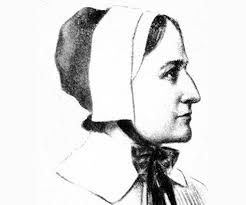A work of creative nonfiction [2017]
By Marcia A. Murphy


We need a second Protestant Reformation. Many Protestant pastors and male church leaders in the modern day United States want control over their congregations. They are just like the Catholic priests and the Pope of 16th century Europe, and also are as controlling as the early colonial Puritan church fathers of the 17th century New England settlements.
And likewise, what was done in the last few hundred years and continues to happen in much of contemporary literature to Anne Hutchinson, needs a rebuke. Not only was she denied legal representation in a court of law in 1637, she has continued to be under or misrepresented in today’s world through erroneous historical narrative and scholarly accounts.
Anne Hutchinson was a happily married woman to a devoted husband and mother to fourteen children. As a leader in her New England community, Boston, she attended gatherings when younger women gave birth which was also a time when she would give spiritual guidance. Growing up, her father, an English clergyman, had given her an education both in general knowledge and in the biblical scriptures. She could spar with the quickest male minds over logical analysis of any given text. A deeply religious woman, she told of her experience of God speaking to her directly, telling her that she could be assured of her salvation through belief in Jesus Christ. She need not, then, go through the patriarchal hierarchy of the Puritan church for their interpretations of scripture or to obtain salvation and forgiveness of sins. She, by having her own personal experiential relationship with God, could interpret scripture for herself, without a male pastoral mediator. This, she said, was to be true for everyone.
In my imagination I wanted to meet Anne, so I created the following scenario:
One bright summer morning I sat down with Anne to have tea at my wooden kitchen table . . . I pictured her stirring the sugar until it dissolved and setting the spoon down on the saucer. She wore the traditional long dress with a low collar, white blouse fastened at the center with a broach, and a modified cotton bonnet tied beneath her chin concealing her long thick brown hair that undoubtedly would be wrapped about in a bun in the back. I had a few questions and comments. But most of all I just wanted to give her an opportunity to speak her mind and defend herself since all the written records of her trial and life written by her contemporaries had been composed entirely by her enemies and, therefore, could not be trusted as representing the truth. Such bias provided the world with an obviously slanted and possibly false view of her life, ordeal, and ideas, and needed to be exposed.
“Anne,” I said, “this whole thing about you espousing antinomianism and familism is ridiculous. Things were said about you just to discredit you. Don’t you agree?”
“Yes, definitely,” she said. “When I stated that I heard God’s voice and guidance for me, His messages never directed me to go against scripture. I have maintained that we are accountable to God, the opposite of what others said.”
By late 1636, as the controversy deepened, Hutchinson and her supporters were accused of two heresies in the Puritan church: antmomianism and familism. The word “antinomianism” literally means “against or opposed to the law”; in a theological context it means “the moral law is not binding upon Christians, who are under the law of grace.” Technically, if one was under the law of grace then moral law did not apply, allowing one to engage in immoral acts. “Familism,” named for a 16th-century sect called the Family of Love, involved one’s perfect union with God under the Holy Spirit, coupled with freedom both from sin, and from the responsibility for it. While Hutchinson and her supporters were sometimes accused of engaging in immoral behavior or “free love” to discredit them, such acts were antithetical to their doctrine. Hutchinson, Wheelwright, and Vane all took leading roles as antagonists of the orthodox party, but theologically, it was Cotton’s differences of opinion with the colony’s other ministers that was at the center of the controversy. — From Wikipedia
Anne took a sip of tea, then continued.
“The Bible is God’s word and my messages from God are and have completely been in line with scripture. My political opponents have only used the accusations of antinomianism to try to discredit me. And the same goes for familism. Nothing in my theology supports familism—in fact, I am against all immorality and support God’s laws in scripture. What I’ve tried to express is that the law only shows us how sinful we are; and it is by grace we are saved. Grace is a free gift which cannot be earned by following the law or by works. I do not say that the law is void; only that one cannot be saved by trying to follow the law. We need grace and by grace, we are saved, which has to be combined with faith in Christ. It is our choice whether to believe in Christ or not. I have emphatically stated that we cannot be saved by good works, or by trying to earn our salvation.”
I said, “I think that the men in the New England Puritan community felt threatened by your mental agility and independence. They were insecure in their masculinity so they tried to destroy you. Your husband, Governor Vane, and John Wheelwright, were the exceptions. In my experience, I have personally found that Anabaptist males, as well as male Quakers and Jewish men show admiration and support for strong females, women with abilities, and promote more of a spirit of equality between the sexes. There seems to be more of a balance of give and take with these sorts of men, not the power games of dominance and control.”
“Yes,” Anne said, “my husband was exceptional in that regard. We had plenty of lively conversations throughout our marriage.”
I continued, “I’ve noticed in our modern world that Presbyterian men seem to prefer one of three types of spouses. Susan B. Anthony characterized two being the doll or the drudge. The doll being a princess whose main purpose is to look pretty and make sure her husband’s clothes are stylish. Or the drudge, a hardworking servant woman who has little time to relax or sleep or take care of her appearance. But also in the Presbyterian sector there has emerged a third type of female: one who takes a leadership position in church polity and the broader community, without neglecting her appearance or succumbing to a slave-like mentality.”
“There is the ever-present danger of idolizing our spouse; disordered loves,” Anne said.
“Yes,” I said. “I’ve noticed that women who idolize their husbands and refuse to think for themselves gradually lose their own mental abilities altogether. Sort of a use it or lose it situation. There are intelligent women in medicine that have garnered respect from some male colleagues, though this is lagging behind in other areas of the scientific field.
“Anne, it really bothers me that Thomas Weld created such fraudulent documents to try to discredit you. So few people question his actions and this out of ignorance.”
The minister, Thomas Weld, who came to Boston in 1632, was known as one of Hutchinson’s fiercest opponents and was present at her civil trial. Not many people know that he was also infamous for creating a fraudulent document called the “Narragansett Patent” to try to strengthen the Massachusetts claim to the area known today as Rhode Island. His lying in this matter lead to his dismissal as a colonial agent and is proof that he was not one to be trusted. Therefore, his account of Hutchinson and what he stated were her religious beliefs are most likely fraudulent also since his aim in creating them was to discredit her. Weld’s list of her so-called beliefs has been presented as past and current evidence of her heresy, but I maintain they are as misleading and false as the Narragansett Patent document.
“It’s true,” Anne said, “Weld was a schemer and conniving enemy. Besides being a misogynist, he had no tolerance for theological debate. It was either his way or no way. Women, in his book, were either harlots, misfits or illiterates, with little room for the educated, well-rounded female personality. He did, most certainly, lie about my beliefs. As I stated earlier, my theology was strictly backed by the Bible.”
After a few moments of silence we finished our tea and said our good-byes. Such was the dream of having tea with Ms. Hutchinson. We’ll never know the truth unless it is revealed in Heaven. I hope to meet her there . . . .



